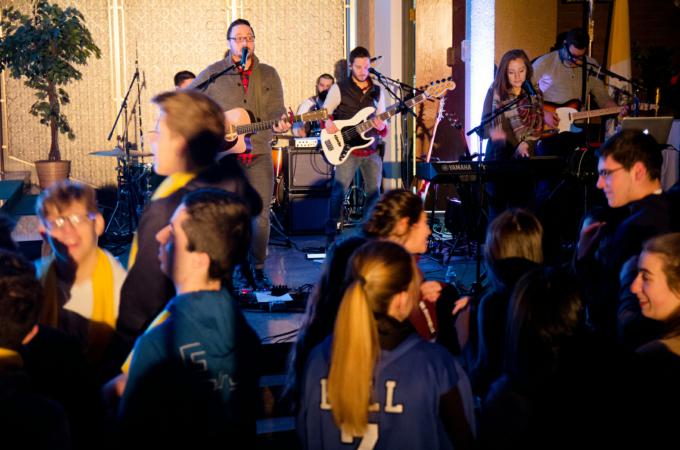Youth embrace life at March for Life kick-off rally
FRAMINGHAM ? A blue-purple glow spotlighted the dancers as they swayed side by side, their arms over each other's shoulders. They mouthed the words to the song that was being played live only feet in front of them, and through the lyrics they professed their love for God and praised his divine providence.
It was 7 p.m. on Jan. 18, and St. Stephen Church in Framingham was alive with music and dancing, prayer and worship, and the excitement that comes right before a pilgrimage.
Dozens of youth and young adults gathered at St. Stephen for the Witness to Life Rally, sponsored by the Archdiocese of Boston and held for those attending the 45th annual National March for Life in Washington, D.C. the next day.
Lasting until after 9 p.m., the rally featured spiritual music, a period of prayer, and talks from pro-life speakers, as well as an address from Boston auxiliary Bishop Mark O'Connell. Youth traveling with the archdiocese's Office of Lifelong Faith Formation and Parish Support to the March for Life boarded buses following the Mass, and traveled overnight to Washington, D.C.
Standing in front of the altar, Bishop O'Connell, holding a microphone in one hand, his other hand outstretched, addressed the young people directly.
"You are not the future of the Catholic Church," he said, pausing for just a moment as those gathered fell into confused silence before continuing. "You are the Catholic Church right now!"
A cheer erupted from the pews, applause echoing throughout the church.
"Your voices are powerful now," the bishop continued. "They won't just be powerful in the future, we won't just need you in the future ? we need you as you are right here and right now."
"Powerful voices, let them be heard, let them roar, let people see you, let them hear this message of life. Life for those who don't have a chance, those whose rights are taken away by the law," including the unborn, the poor, and refugees, he said.
In separate talks, pro-life speakers Sarah Mary Toce, director of the New England Life and Leadership Project, and Paul Gondreau, professor of theology at Providence College, spoke on the inherent life of an unborn child, God's love for each and every person, and the love and compassion those in the pro-life movement should demonstrate to others.
"We are a pro-life movement, one of compassion and one of love," said Toce.
Offering advice to the youth on how to turn hearts and minds on the issue of abortion, Toce said to approach those in favor of abortion with love, steering away from accusations or negative comments and instead reminding them that a fetus is a baby, alive and loved by God.
It's important to have sympathy for those who had abortions, and offer a compassionate hand if they need it, she said.
"You, my friends, are the pro-life generation," said Toce, addressing the youth directly. "You are the giants in the movement; you are our present hope and our future change. You are it, you are it."
Gondreau, drawing on his roots in philosophy and theology, posed the question: What is a human person? Our "deeply confused and troubled culture" has a "very hard time answering this question," he said.
Yet, the answer is simple, Gondreau said: "The Church and the biblical teaching has always taught that what makes us human is having a body and a soul. It is not more complicated than that."
The culture in which we live wants to "reduce our humanity to the purely physical," ignoring the soul, he continued. That doesn't work, as we are "a body-soul entity."
Simply based on that, everyone, including the unborn, is a human person, made in the image of God, with both a body and a soul, he said.
For, in the end, at the final resurrection, he said, all shall be "as God originally intended us to be when he first made us," and will "restore us to the ultimate dignity that he has endowed upon us."



















